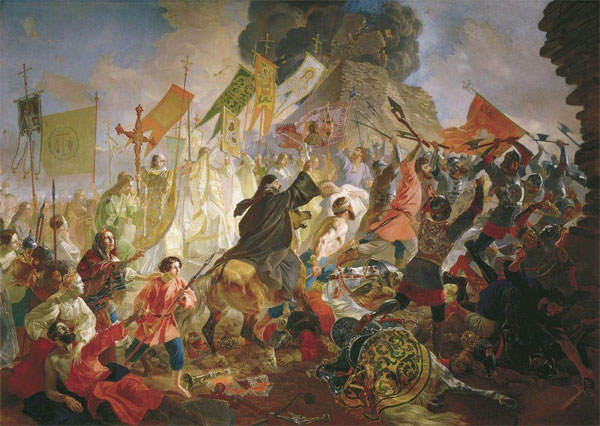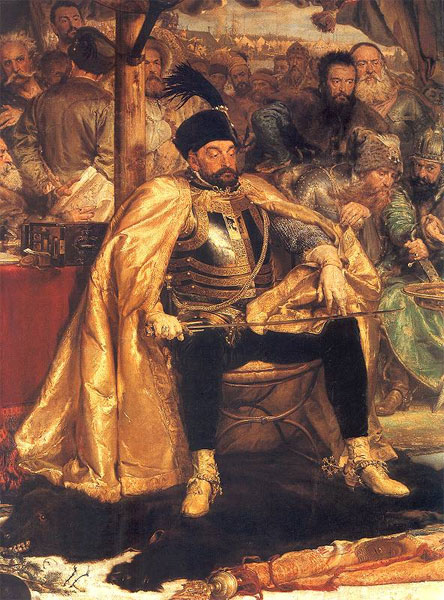
Two January Dates
/ Главная / Russkiy Mir Foundation / Publications / Two January DatesTwo January Dates

The Peace of Yam Zapolski of 1582 signed on January 6 (15) between Russia and the Polish-Lithuanian Commonwealth, which brought an end to the Livonian War, can hardly be called an occasion for national celebration. Under the treaty, Russia ceded Polotsk to Poland, as well as gave up all the gains it had made over the course of twenty years in Livonia. The treaty did not contain a single word about the Baltic cities that were occupied by Swedish troops (including Narva, which had been transferred to the Swedes in October 1582), although the tsar’s hopes of using the freed-up troops against the Swedish army were not justified. In the end, the treaty nullified all of Russia’s successes during the Livonian War.
We should not rush to accuse the Russian diplomats who were involved in these negotiations, however. Given the circumstances at the time, they did everything they could. Moreover, the conditions of the peace agreement would certainly have been much worse had it not been for the unparalleled heroism shown by the inhabitants of Pskov and the garrison under the command of governor Ivan Petrovich Shuisky during the autumn and winter of 1582.
... The summer of 1577 became the apotheosis in the reign of Ivan the Terrible. On July 13, he began a campaign against Livonia, which he intended to partition and thus decide the outcome of the war. The Livonian fortresses and garrisons, which numbered several dozen people, opened their gates one after another. On July 16, Marienhausen surrendered, on July 24 – Ludza, on July 27 – R
Desperate to take the city by storm, Batory moved to the planned siege. It did not bring the desired results, however. The royal army was decidedly unprepared for a long campaign in the fall and winter. Large losses, cold and a lack of provisions had a demoralizing effect on soldiers. Many of them went to villages in search of food. The king’s men quickly melted. It was in these circumstances that Batory left for Poland. Behind him the camp was abandoned by many nobles and hired soldiers who did not receive their money.
The defenders of Pskov also had a difficult time. Food supplies were dwindling, and the city faced a famine. The thought of surrender did not cross their minds, however. Moreover, on January 4, 1582, Shuisky undertook a major raid and nearly captured the royal camp.
It was at this moment that Russian ambassadors went to the Poles with a proposal to start peace negotiations. Originally, the Polish side demanded recognition of the rights of the Commonwealth for the whole of Livonia as well as the right to keep all of the border towns. However, at this moment from the siege camp near Pskov a letter arrived from Hetman Zamoysky who wrote that the position of army was difficult that it was unlikely to last more than eight days. After that, the Poles were immediately ready to make concessions and agreed to restore Russia's great fortresses of Velikiye Luki, Kholm and Nevel, Velizh, as well as the “outskirts of Pskov.” Of course, even after these new peace terms, Moscow’s position was difficult, although the heroism of the defenders of Pskov allowed Ivan IV to avoid final catastrophe and even “save face” to a certain degree.
In this regard, it is impossible not to recall another January date – January 8, 1570, when Ivan the Terrible arrived in Novgorod with his Oprichnina troops. What happened next is well known – the city was destroyed and looted, and thousands of its residents were executed and exiled. The unit Malyuta Skuratov alone, according to the official reports, “finished off 1,490 people.”
Taking care of the Novgorod residents, Ivan the Terrible moved on with his Oprichnina troops to Pskov where he had planned the same fate. At the last moment, however, the tsar gave up on his plans. The details of Pskov’s salvation differ depending on the source, but they all agree that Ivan met a certain holy fool on the road to Pskov. As a result, the superstitious tsar abandoned plans to crack down on the city, limiting his actions to robbery of the local clergy.
It is not known whether Ivan remembered the holy fool of Pskov when a messenger was sent to the camp of Stefan Batory. But today we can confidently say that, standing in Ivan’s way, the man probably saved more than just his own city. Given that Pskov was spared Novgorod’s fate, one can only speculate whether it could have withstood one of the best armies in Europe at the time. The peace between Russia and the Polish-Lithuanian Commonwealth would most likely have not been signed in the backwater of Yam Zapolski, but somewhere further east and under much, much more difficult and humiliating conditions.
New publications

 Mikhail Kalatozov, a director who transformed the world of cinematography in many ways, was born 120 years ago. He was a Soviet film official and a propagandist. Above all, he was capable of producing movies that struck viewers with their power and poetic language.
Mikhail Kalatozov, a director who transformed the world of cinematography in many ways, was born 120 years ago. He was a Soviet film official and a propagandist. Above all, he was capable of producing movies that struck viewers with their power and poetic language.  Ukrainian authorities have launched a persecution campaign against the canonical Ukrainian Orthodox Church (UOC), the biggest one in the country's modern history. Over the past year, state sanctions were imposed on clergy representatives, searches were conducted in churches, clergymen were arrested, criminal cases were initiated, the activity of the UOC was banned in various regions of the country, and monasteries and churches were seized.
Ukrainian authorities have launched a persecution campaign against the canonical Ukrainian Orthodox Church (UOC), the biggest one in the country's modern history. Over the past year, state sanctions were imposed on clergy representatives, searches were conducted in churches, clergymen were arrested, criminal cases were initiated, the activity of the UOC was banned in various regions of the country, and monasteries and churches were seized.  When Nektary Kotlyaroff, a fourth-generation Russian Australian and founder of the Russian Orthodox Choir in Sydney, first visited Russia, the first person he spoke to was a cab driver at the airport. Having heard that Nektariy's ancestors left Russia more than 100 years ago, the driver was astonished, "How come you haven't forgotten the Russian language?" Nektary Kotlyaroff repeated his answer in an interview with the Russkiy Mir. His affinity to the Orthodox Church (many of his ancestors and relatives were priests) and the traditions of a large Russian family brought from Russia helped him to preserve the Russian language.
When Nektary Kotlyaroff, a fourth-generation Russian Australian and founder of the Russian Orthodox Choir in Sydney, first visited Russia, the first person he spoke to was a cab driver at the airport. Having heard that Nektariy's ancestors left Russia more than 100 years ago, the driver was astonished, "How come you haven't forgotten the Russian language?" Nektary Kotlyaroff repeated his answer in an interview with the Russkiy Mir. His affinity to the Orthodox Church (many of his ancestors and relatives were priests) and the traditions of a large Russian family brought from Russia helped him to preserve the Russian language.

 The leaders of the Friends of the Great Russia cultural association (Amici Della Grande Russia) in Italy believe that the Western policy of abolishing Russian culture in Europe has finally failed. Furthermore, it was doomed to failure from the beginning.
The leaders of the Friends of the Great Russia cultural association (Amici Della Grande Russia) in Italy believe that the Western policy of abolishing Russian culture in Europe has finally failed. Furthermore, it was doomed to failure from the beginning.  Name of Vladimir Nemirovich-Danchenko is inscribed in the history of Russian theater along with Konstantin Stanislavski, the other founding father of the Moscow Art Theater. Nevertheless, Mr. Nemirovich-Danchenko was a renowned writer, playwright, and theater teacher even before their famous meeting in the Slavic Bazaar restaurant. Furthermore, it was Mr. Nemirovich-Danchenko who came up with the idea of establishing a new "people's" theater believing that the theater could become a "department of public education."
Name of Vladimir Nemirovich-Danchenko is inscribed in the history of Russian theater along with Konstantin Stanislavski, the other founding father of the Moscow Art Theater. Nevertheless, Mr. Nemirovich-Danchenko was a renowned writer, playwright, and theater teacher even before their famous meeting in the Slavic Bazaar restaurant. Furthermore, it was Mr. Nemirovich-Danchenko who came up with the idea of establishing a new "people's" theater believing that the theater could become a "department of public education."  "Russia is a thing of which the intellect cannot conceive..." by Fyodor Tyutchev are famous among Russians at least. December marks the 220th anniversary of the poet's birth. Yet, he never considered poetry to be his life's mission and was preoccupied with matters of a global scale. Mr.Tyutchev fought his war focusing on relations between Russia and the West, the origins of mutual misunderstanding, and the origins of Russophobia. When you read his works today, it feels as though he saw things coming in a crystal ball...
"Russia is a thing of which the intellect cannot conceive..." by Fyodor Tyutchev are famous among Russians at least. December marks the 220th anniversary of the poet's birth. Yet, he never considered poetry to be his life's mission and was preoccupied with matters of a global scale. Mr.Tyutchev fought his war focusing on relations between Russia and the West, the origins of mutual misunderstanding, and the origins of Russophobia. When you read his works today, it feels as though he saw things coming in a crystal ball...